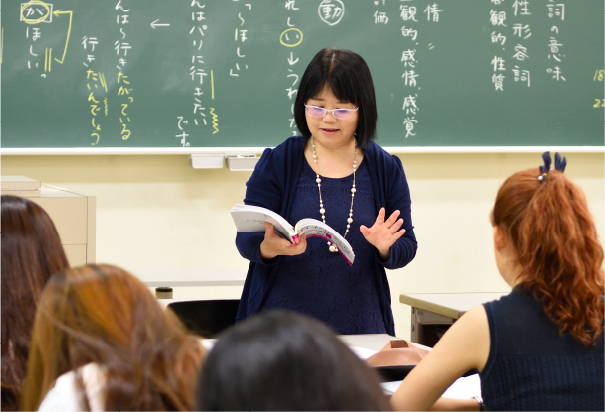This course is designed for diverse studies on the Japanese language,
culture and society, which are indispensable for succeeding
in Japan’s globalizing society.
This course was established for international students with the aim of nurturing professionals in the Japanese language and culture.
This course strictly adheres to the principle of small-class education, giving students the communication skills necessary for succeeding in Japan’s globalizing society.
This course offers a series of subjects that help international students participate in Japanese society, such as Practical Training in Japanese Society and Workshop on Modern Japanese Society, which are offered instead of the study abroad program available in the other courses of the Faculty.
The curriculum of this course includes study tours to companies, public institutions and cultural properties, and problem-solving workshops given by lecturers invited from companies and other external organizations.
These studies help students enhance their practical Japanese skills and deepen their understanding of every aspect of Japanese society and culture, and encourage them to participate in extracurricular activities such as internships and volunteer activities, so that they will be able to play an active role in Japanese society in the future.
The course also offers seminars that enable students to cope with various communication problems that foreign people in Japanese society are likely to face, based on an in depth understanding of the Japanese language, culture and society.
Offering education under an improved curriculum
Helping students enhance their Japanese and English proficiency to play an active part in global society
The curriculum allows students to learn Japanese and English systematically according to their own level, and to develop the practical foreign language skills necessary to play an active role in Japan’s globalizing society. Students are also taught how to address various communication problems they may face in Japanese society.
Strengthening the collaboration with companies and local communities
Problem-solving workshops by instructors invited from companies and local communities will be added to the curriculum as a compulsory subject. These, along with conventional visits to public institutions and local companies for practical training, will enable students to learn about Japanese society first-hand. The course will also introduce a support and follow-up system to encourage students to participate in extra-curricular activities both inside and outside of the university, taking advantage of small-class education.
Offering more venues for international students to study with Japanese students
In addition to the subjects common to all the courses of the Faculty, such as Introduction to Global Communication and Seminar Project, each course will offer subjects for international students and Japanese students (or students who have graduated from Japanese high school) to study together. Also, the Faculty will officially start a tandem partner system as an extra-curricular program, in which a Japanese student pairs with an international student to teach and learn each other’s language.
4-year Japanese Course Program
| First year | Second year | Third year | Fourth year | |||||
|---|---|---|---|---|---|---|---|---|
| First semester | Second semester | Third semester | Fourth semester | Fifth semester | Sixth semester | Seventh semester | Eighth semester | |
| Seminars | First-year Seminar |
Basics of Communicating in Japanese Globalization and Japanese Society Workshop on Modern Japanese Society |
Intermediate Seminar | Advanced Seminar Seminar Project |
||||
| Japanese-language subjects |
||||||||
| Japanese-language subjects |
Presentation Academic Writing Critical Reading |
Practical Japanese-language subjects | ||||||
| Specialized lectures |
Basic lecture (common to the three courses) Introduction to Global Communication |
Lectures on global issues Lectures on Japanese culture Lectures on Japanese language |
||||||
| Japanese language and second foreign language |
Japanese English (Chinese, German, French) |
|||||||
| Liberal arts subjects |
General liberal arts and educational subjects Subjects offered by other faculties Japanese affairs subject offered as one of the Japanese-language and Japanese-culture/educational subjects Subjects covered by the credit-exchange system with Doshisha Women’s College of Liberal Arts Subjects covered by the credit-exchange system of the Consortium of Universities in Kyoto |
|||||||

Sample Class Basics of Communicating in Japanese
This subject allows students to acquire a detailed understanding of Japanese grammar, conversation, pronunciation, and Japanese-language education. Based on this knowledge, students develop an overall understanding of Japanese as a communication tool essential for interpretation and translation, by examining how Japanese is actually used and comparing it with their own language. Students are expected to become fluent in Japanese by studying how Japanese is used in various settings from daily conversation to business negotiations.
Attainment Target
- Test of Practical Japanese (J-Test) Pre-A Level
- Business Japanese Proficiency Test (BJT) J1 Level



